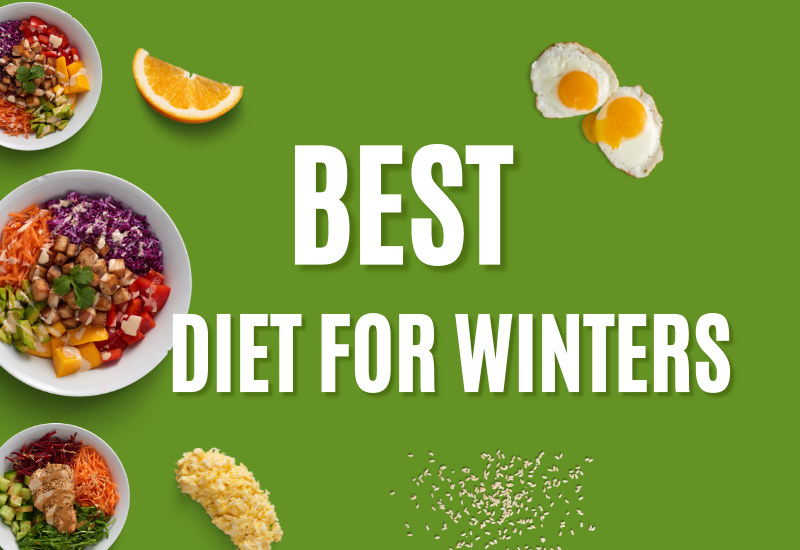DIET IN WINTERS
Winters are in full throttle; so how do we make sure that you get the required nutrition to fight demons like cold, flu, fever, cough and congestion. According to Nutritionist Sally Wisbey, our diet is crucial to boosting our immune system and helping fight off the bugs. In winters, our body craves for foods which provides warmth and nourishment to maintain the balance of serotonin, which is a calming brain chemical. It further helps in not and triggering hunger pangs.
Cold weather demands extra calories to keep warm. But spicy foods and consumption of alcohol in winters not keep our body warm even though you may sweat after consuming them. It is just because of the reason that spicy food stimulates the pain receptors on the tongue, an automorphic response dilates the blood vessels in the skin. It causes loss of body heat in the form of sweat.
Eating out sometimes is not bad. You should watch out for healthy snacks. Fried products like samosas which are prepared on roadside joints are cooked in reheated oil or lard which is rich in artery- clogging trans fats. If you want to have such products then you should make them at home with fresh oil.
The fruits in season (apple, custard apple, dates, etc.), spicy and low fat snacks, and hot chocolate are ideal comfort foods in winter.
In winters, you should take enough water but generally it is neglected. The cold, dry air draws water away from your body so sip water at regular frequent intervals during the day.
Eat a balanced diet. Balanced diet is a diet which includes food items from all food groups in proper amount or proportions to maintain healthy and free from diseases. So, here I shall mention the food items which you may eat in winters according to various food groups.
Cereals:
Add pearl millet (Bajra) in your diet as this cereal has high fiber content and its good for heart, controls cholesterol and even prevents diabetes, cancer and asthma. It is rich in B-group Vitamins that helps in digestion and detoxify your body. Bajra roti and khichdi you can consume in winters.
Pulses:
Pulses such as kidney beans, broad beans, lentils and chickpeas are good for us because they reduce cholesterol, prevent heart diseases and contribute to healthy bones and teeth. They are good sources of proteins, minerals, iron, zinc and B group vitamins such as folate. They are rich in fiber which decreases cholesterol levels and decrease the risk of type 2 diabetes and heart diseases.
Yellow moong dal soup is good in cough, cold and in fever conditions.
Fruits and vegetables:
Choose fruits and vegetable rich in vitamin C. Vitamin C plays an important role in the immune system and energy levels.
Citrus fruits amla especially oranges are seasonal fruit rich in Vitamin C, antioxidants boosts immune system and good for healthy glowing skin. Add papaya.
Carrots, beetroot – add in salad, soups you can eat it alone. It also boosts immune system. Add dates as they are warm in nature and are highly recommended in the winter months .consume sweet potatoes, tomatoes, red peppers.
Spinach is good source of zinc. Consume other green leafy vegetables also.
Pomegranates are rich in antioxidants, and make our heart healthy.
Green beans (broad beans, valol) and peas, these are high energy and high protein vegetables.
Spices:
Asafetida (hing), mustard, black pepper, ajwain, suva seeds are all warm spices. They are valuable remedy for cough and cold. These spices stimulate appetite and digestion and increases blood circulation. Methi (dry or sprouted) is beneficial for bone and joint problems. Turmeric is also an antimicrobial immunity builder.
Basil (tulsi leaves) protects against cold and fever and strengthen our immunity.
Ginger is warm sliced with lime and salt is a common accompaniment with meals. It can be added to dals, vegetables, milk and tea. Dry ginger powder made into tiny ladoos with jaggery and ghee is very good to combat with winter chills.
Eggs:
Eat whole egg. It is rich in calcium and protein. You can consume it in boiled, poached form or make an omlette.
Dry fruits and seeds:
Dry fruits and nuts suppress your hunger pangs and generate heat in the body during the cold months. Consume almonds, peanuts, sesame seeds, walnuts and cashews. They are natural sources of zinc, vitamin C, selenium, and omega – 3 fatty acids.
Milk and milk products:
Milk is considered to be one of the healthiest sources of calcium, vitamin D and potassium. Whereas in winter one must avoid cold milk and instead of it drink hot. Turmeric milk or milk with added ginger nourish the body and keep us warm. Milk has sedative properties so drinking milk before bedtime may also help you calm down the serotonin content in the milk in inducing a good and sound sleep.
Consume hot chocolate, jaggery in winters. Cinnamon adds flavor and taste in food. You can add it in tea, coffee, and milk. Chikki, til ladoos are good in combating winter chills.
So say hello to hail and hearty winters!!
